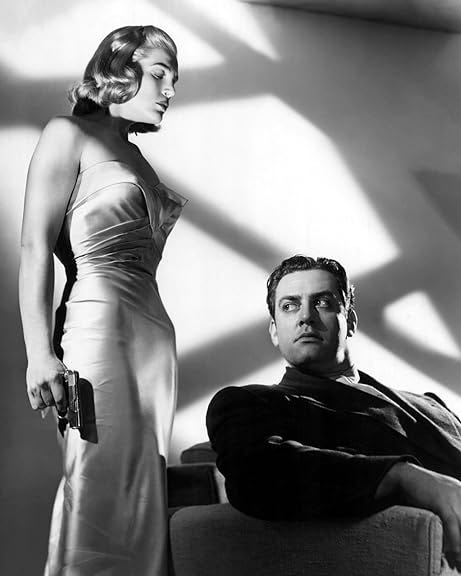Anyone who is at all familiar with film noir knows about and has probably seen Double Indemnity, starring Fred MacMurray and Barbara Stanwyck. In that classic, insurance salesman MacMurray is seduced by Stanwyck, who convinces him to help murder her husband for insurance money. The film set the template for noirs featuring femme fatales luring men to their dooms.
As great as that movie is, in my opinion, 1948's Pitfall is a more bleak take on the form with a subversive thumb in the eye of status quo morals. (Spoilers ahead)
Dick Powell, who in the mid-forties was making the transition from a leading man in lightweight movies to more tough guy roles, plays an insurance investigator who is tipped off by private investigator Raymond Burr that Lizbeth Scott is involved in an embezzlement scheme that sent her lover to prison. Seeking to recover assets hidden from his company by the crime, Powell visits her at her apartment and winds up having drinks and taking a cruise in her lover's speedboat. This is very questionable behavior for a married man and insurance investigator especially after he allows her to keep the speedboat and sleeps with her.
Unfortunately, Burr's character is obsessed with Scott, and he winds up beating Powell for his involvement with her, threatening to expose the affair to his wife if he doesn't stop seeing Scott. Powell agrees and goes back to his wife, but Burr gets to Scott's lover in prison, telling him about the affair, enraging him. Shortly afterwards, the criminal gets out of prison and goes after Powell at his home. Powell shoots him dead, framing him as a random prowler. Meanwhile Scott shoots Burr, who thought that Powell was finally out of the way and that he had her to himself.
The movie ends on a somber note with Powell confessing his infidelity to his wife and his involvement with Scott to the authorities. The DA chooses not to press charges against him and his wife agrees to take him back, but with a very clear indication that things are not well between them. Meanwhile, Scott is potentially headed for prison for her killing of her stalker.
Under the Production Code, the institution of marriage was supposed to be protected. Certainly there were stories of infidelity told throughout the golden age of Hollywood, but the "crime" was usually punished stringently. In The Letter (1940) Bette Davis' infidelity is punished with knife to the chest at the end of the film. In The Postman Always Rings Twice (1946), another movie where a femme fatale convinces a man to kill her husband, Lana Turner, the wife, is killed in a car crash and John Garfield, the lover, winds up on Death Row. And of course in the aforementioned Double Indemnity, the murderous couple wind up killing each other in the end.
During production of the 1947 movie The Unfaithful, where a woman kills her wartime lover, PCA head Joseph Breen communicated to the producers: “We regret to advise that this basic story seems unacceptable under the provisions of the production code in that it appears to be a story of adultery without sufficient compensation and moral values. Under the requirements of the code, of course, adultery must be shown to be wrong, there must be a voice for morality, and there must be sufficient punishment for the sin of adultery itself.” In other words, it was OK to portray infidelity but severe punishment for committing it was required. In this case, it was felt by the PCA that any attempt to write a nuanced examination of wartime marital stresses was unacceptable, since the person who committed the adultery should be clearly blamed and punished.
In Pitfall, Lizbeth Scott's character is not a femme fatale. She is a vulnerable woman confronted by a man who has power over her, a man who is already unhappy with his marriage and unsatisfying job. She falls into his arms, at least in part to find someone who can protect her from her nearly insane stalker, Raymond Burr. In this story, the woman is not the source of the man's failure; the man carries his weaknesses and failings into the relationship with him. He kills her old lover to save himself; she kills Burr because he is practically kidnapping her. But despite that, at the movie's end, she is facing prison time and Powell gets to go back to his old life.
In a story where two lovers conspire to commit murder and follow through with it, the audience of that day could accept that they must both die or go to prison. They were both guilty after all. But in Pitfall, even in a more repressive time, it's hard to see the Lizbeth Scott character as anything but a victim. She was under the thumb of three different men, all of whom committed crimes, and two of whom were willing to kill to keep her. I imagine that women in the audience sympathized with the Scott character and men identified with Powell's character's disillusionment with marriage and a career.
Hardly a ringing endorsement for the institution of matrimony.






Cool piece.
A great aspect of noir is that characters are archetypes and the plots are permutations of a handful of formulas that worked very successfully in that era.
Most modern movies need this kind of simplicity and structure.
It seems like having a code was good for storytelling, even if from a writer's perspective it was a limitation. Clever writers could use a framework that proved successful in the past, and sneak adult themes to the audience. Very similar to the way David Lynch got a lot perviness past censors with the original Twin Peaks.